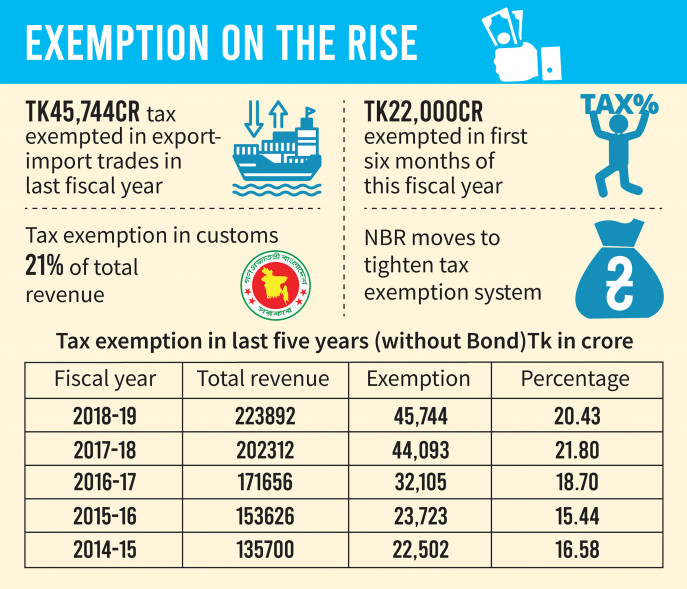SAMI
Published:2020-03-15 15:05:17 BdST
Ending exemptions would raise tax-GDP ratio
FT ONLINE
Though Bangladesh ranks among the lowest in terms of tax-GDP ratio across the world, the amount of tax exemptions has more than doubled in the last five years.
If the government did not give these exemptions, the country's tax-GDP ratio would increase by nearly two percentage points to 10.61 in 2018-19; a sign that could cheer up the finance minister who often faces criticism from internal and external sources for poor revenue in terms of the economy.
According to National Board of Revenue (NBR) data, tax exemptions just for imports and exports were Tk45,744 crore in the last fiscal year. This is 20.43 percent of total revenue collection.
In addition, the tax authority does not have data about exemptions on income tax and bonds. If this exempted amount is added, the exemption figure will be higher, experts say.
Economists say most of the time the government and big investors receive the benefits of tax exemptions in the industrial sector. This creates a tax disparity as the money is not spent on development work.
In addition, as the tax-GDP ratio is low, the sustainability of economic growth is at risk, the economists observe.
Dr Ahsan H Mansur, executive director of the Policy Research Institute (PRI), said, "This is a government expenditure. The government could spend this money on the people. This is one of the main causes behind slow revenue growth. That is why our tax-GDP ratio lags behind that of other countries."
"Tax expenditures must be kept at a logical level. Otherwise, they will continuously increase and may create a problem for the revenue sector. If this continues, GDP growth will be at a sustainability risk," added Mansur.
NBR officials said the government mainly exempts large amounts of revenue from: capital machineries, defence items, the import of relief material, goods by diplomatic missions, and lawmakers' cars. Additionally, tax exemptions on the import of fabric, textiles, pharmaceuticals, poultry, mobile and computer manufacturing components, and ship building material is increasing every year.
"Due to tax exemptions on the import of capital machinery for different development projects in the last several years, tax expenditures rose by more than double," said NBR sources.
They said in fiscal year 2014-15, the tax exemption against imports was Tk22,502 crore. After five years, the amount rose to Tk45,744 crore. In the first six months of the current fiscal year, it rose further and stood at Tk22,000 crore. The tax exemption is calculated on the goods for which duties are applicable.
As per the Customs Act, the NBR does not calculate the amount of tax exemptions on goods for which zero duties apply. Revenue officials say if the tax breaks for 36 sectors – including the corporate tax rebate on the income tax of these items, tax exemptions at the source for garments products and agriculture, VAT and tax exemption on the gas and power sector for the local market – are calculated, the amount may increase several times.
Dr Zahid Hussain, former lead economist at the World Bank's Dhaka Office, said the NBR has been lagging behind in tax-GDP ratio due to this massive amount of tax exemptions.
He said, "The government has been imposing taxes on different sectors to increase its income, thus increasing the suffering of the people on one hand, and giving tax exemptions because of lobbyists on the other."
Dr. Zahid said it is necessary to publish the list of real beneficiaries of tax exemptions and how much the country's economy benefits from them.
The NBR itself thinks a large amount of tax exemption facilities are being misused every year. In January, it decided to scrutinise the tax returns of the individuals and firms who received tax exemptions, tax abetting and reduced tax facilities.
The revenue authority has formed a seven-member committee with its board member Rawshan Ara Akter as its convener. The committee has already started working.
Further, the NBR has formed a separate committee to reduce the limit of exemptions on the import of capital machineries and spare parts for the power sector.
At present, 36 sectors – including medicines, agro processed products, information technology, bio-technology, bio-fertiliser, manufacturing insecticides – enjoy a 100 percent tax exemption.
Additionally, in the budget for fiscal year 2015-16, a 10-20 percent tax exemption was given in setting up production-oriented industries outside city corporations.
Duty exemptions have also been given for the import of spare parts for mega projects – including power plants.
An NBR board member said, "The revenue authority has prepared a list of imports of spare parts for the power sector and raw material for the industrial sector. Such lists will be made for other sectors in phases."
Finance Minister AHM Mustafa Kamal said the exemption is being given for infrastructure development and to attract investment.
He said, "The government collects revenue mainly for the development of the country. If an exemption were not given for projects, more allocations would be required. The exemption in the industrial sector has been playing a role in investment."
Unauthorized use or reproduction of The Finance Today content for commercial purposes is strictly prohibited.


